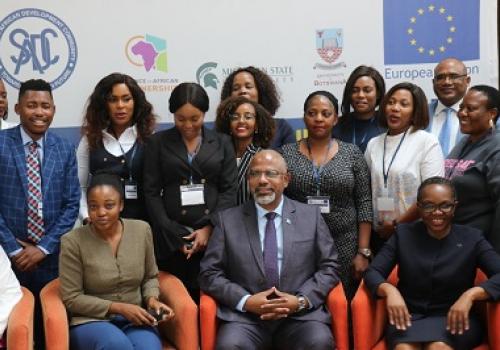The Southern African Development Community (SADC) Secretariat in partnership with the Alliance for African Partnership (AAP) and the University of Botswana (UB) held a dialogue aimed at empowering the youth with employment and entrepreneurial skills, in Gaborone on 4th and 5th April 2022. The dialogue brought together youth leaders from the SADC Region, regional innovation ecosystem institutions, national governments and the private sector to dialogue on key socio-economic issues specific to policy, education, life and entrepreneurial skills. In response to the significant challenges that the youths experience, such as unemployment, access to education and poverty, the dialogue therefore sought to provide an enabling platform for the youth to co-create solutions and opportunities with key stakeholders.
The Youth Dialogue was funded by the European Union (EU) under the SADC Dialogue Facility (SDF) which seeks to strengthen cooperation and support the SADC regional integration agenda. SDF aids regional integration goals so that citizens of SADC benefit from stronger, equitable and sustainable economic growth, increased collective leverage in global platforms and enhanced social opportunities. In his opening remarks, Honourable Tumiso Rakgare, the Minister of Youth, Empowerment, Sport and Culture Development of the Republic of Botswana, said SADC must explore ways to facilitate ideas and innovations among its young people.
Honourable Rakgare said the dialogue defines the tone and agenda for the Botswana Government to place youth at the centre of economic development and that his country was committed to supporting young people to be the drivers of change and economic transformation. He bemoaned the effects of COVID-19 on young people in Botswana and the SADC Region, saying the youth were facing difficulties due to the global pandemic. SADC, he said, must strengthen the networks and partnerships among its institutions to facilitate the emergence of youth innovations.
Honourable Aubrey Lesaso, the Assistant Minister of Tertiary Education, Research and Technology of the Republic of Botswana, said empowering and developing the youth requires efforts from multiple points, including education, sexual and reproductive health, physical and mental, vocational training and skills development. He said Africa’s ability to harness the youth dividend and sustainable development was contingent on the extent to which African governments and other sectors of society were willing to work together towards the transformation of nations.
Ms Duduzile Simelane, the SADC Director of Social and Human Development, called for a complete and multi-sectoral approach which involves collaboration and partnerships among stakeholders to ensure synergy in addressing the challenges facing the youth. She said Africa has the world’s youngest population, and therefore, youth will significantly determine the continent’s growth trajectory and its overall impact on the global economy. The youth offer an important opportunity for economic transformation if their talents and skills are developed and channeled into productive employment. Ms Simelane said the dialogue was therefore part of the conversation in the SADC Region to spearhead a multi-stakeholder approach to solving young people’s problems in all their multi-dimensional complexity.
European Union Representative, Mr Pablo Valenzuela, said the EU is a firm believer of the benefits that regional integration can bring to ensure peace, economic and social prosperity for the people, and that this is why the EU supports and promotes regional integration in Southern Africa and in other parts of the globe.
He said the EU has been working for decades in the SADC Region promoting peace and security, environmental sustainability, trade, fostering investments and providing economic opportunities, with a particular emphasis on youth. The EU has contributed more than €415 million in the last two decades to advance the regional integration agenda in Southern Africa, and this does not take into account the specific country programmes in the 16 SADC Member States.
The Director of the AAP and Chair of the Dialogue, Professor Richard Mkandawire, said AAP, its partners and members have prioritised youth empowerment as a key area of focus. AAP is a consortium of universities in southern, eastern and West Africa. Prof Mkandawire said one of the concerns that AAP has is that over the past two decades, youth empowerment has been discussed multiple times at national, regional, continental and even at global level. But despite a plethora of these discussions, millions of young people across the continent remain excluded from the mainstream economy.
University of Botswana Vice Chancellor, Professor David Norris, said it was befitting that young people were at the centre of the dialogue which enables AAP and SADC to develop human-centric initiatives that will bring solutions relevant to and driven by the youth. He said the dialogue was a step in the right direction, must be at the heart of research and policy development, and would give the university the opportunity to strengthen innovation hubs, think-tanks, and centres of excellence that are easily accessible to youth.
Prof. Norris challenged academics not to resist the ongoing disruptions, but to join the disruption movements with the youth in order to support them, learn from them, and mentor them toward a bright future. SADC must create partnerships that would enable cross-border funding for research and entrepreneurship, and that there was no better way to do that than to start with the regional organisation.

